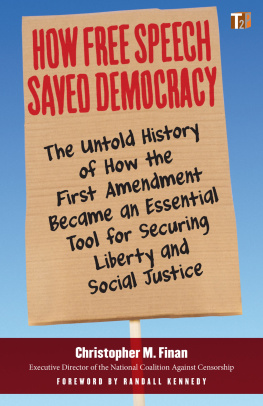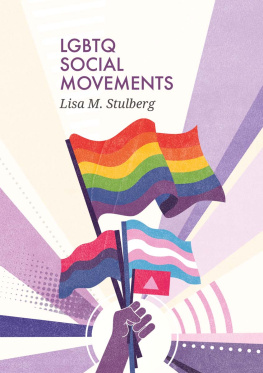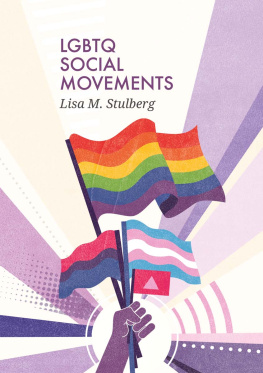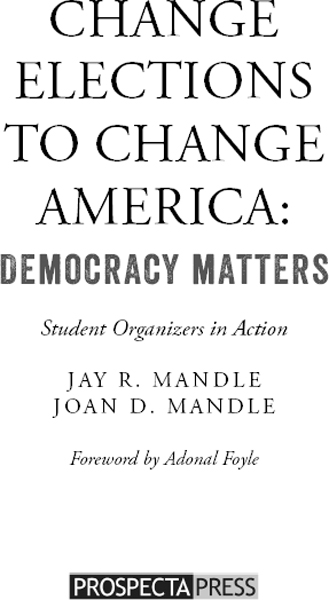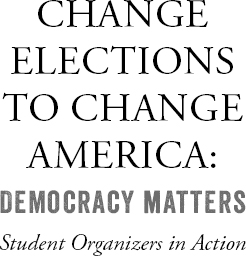Change Elections to Change America: Democracy Matters Student Organizers in Action copyright 2014 by Jay R. Mandle and Joan D. Mandle
All rights reserved.
No portion of this book may be reproduced in any fashion, print, facsimile, or electronic, or by any method yet to be developed, without the express written permission of the publisher.
P.O. Box 3131
Founding Democracy Matters was one of the most exciting and fulfilling things I have ever done. Working with students challenging the right of wealthy elites to use money to control the American political system has been exhilarating, an experience I never could have imagined growing up in Canouan, a tiny island in the Caribbean.
Even in those early years I was aware of politics. I was really, really angry at things I thought were unfairthat my family was so poor I sometimes didnt have enough to eat, that I was beaten by my teachers and picked on by other kids because I was so tall for my age. The calypso and reggae music that surrounded us brought powerful messages of oppression and empowerment.
But more significant for me as a young child was my personal experience with elections. For the 1,200 people living on Canouan, election days were major events. Each year, I watched as my uncle, the owner of a small grocery store, gave free drinks to anyone who said they would vote for his candidate. He then piled voters into his truck and took them to the polls. Uncle was a big man in Canouan because he could deliver votes. I didnt really understand what was happening, but I knew it was important, and that something about it was not right.
When, as a teenager, my adoptive parents, Joan and Jay Mandle, brought me to the United States, I became immersed in politicsbut of a different kind. Joan and Jay were veterans of the civil rights movement, and as university professors were both deeply involved in researching and teaching about political and social change. I remember countless dinner conversations with their friends, all of whom argued passionately for hours about every issue under the sun.
At Colgate University I was a varsity basketball player and didnt have much time to do anything but study and play ball. But many of my friends were involved in volunteer workat soup kitchens, with rape hotlines, creating a community garden, and serving as big brothers or sisters for at-risk local children. A turning point for me occurred one day in my favorite class, on philosophy and religion, during our in-depth study of student activism in the civil rights movement. Our professor accused us and our generation of being apathetic. I fought back, citing the volunteer activities of my friends and other students. I argued that we werent apathetic at all, we cared about the world.
I never forgot that argumentespecially since it went on for almost an hour after class ended and caused me to miss a basketball practice right before my team played a Patriot League Championship game. (We won anyway!)
Two years later, when I found myself playing in the rarified atmosphere of the NBA, I kept thinking back to that class. I realized that my professor was more right than I had given him credit for. I hadnt understood that he was talking about politics. He was saying that we in the 1990s, unlike the young people in the 1960s, lacked a significant political voice. On important public policy questions, ranging from health care and global warming to funding for higher education, students were silent. Because we did not engage in politics, we were not part of the countrys decision-making process. Apathetic might not have been exactly the best word to describe us, but he certainly was correct that we possessed almost no influence on the critical political issues of the day.
The more I thought about young peoples disengagement from politics, the more frustrated I became. I decided to try to use my celebrity status and my income as an NBA player to help overcome their political alienation. My work with Democracy Matters over the last thirteen years has proven just how rewardingand how difficultthat task is.
Being part of Democracy Matters provided a focus of interest outside the pressures of my professional athletic career. Participating with DM students in their programs, projects, conferences, and meetings was both incredibly gratifying, as well as fun. The students optimism, creativity, and enthusiasm inspired me. But Democracy Matters also gave me the opportunity to grapple intellectually with two important questions: first how to lessen the one-sided political power of the big campaign donors who are corroding our democracy; and second how to increase the political engagement of young people.
Over the years I have lectured on and discussed these issues at conferences, universities, law schools, and even more frequently, through the media. As an NBA player, I was already accustomed to interviews with sports reporters and radio and television commentators who focused on basketball, but soon they were questioning me often at length about Democracy Matters. I sensed that the juxtaposition of my love of basketball and my passion for political equality seemed odd to them.
But to me the connection was perfectly obvious. You only make it to the NBA on merit. No one gets there just because he is wealthy or can depend on someone who is. My teammates had no advantages but their talent. And on the court, a clear set of rules was (usually) administered fairly. Everyone was equalno team is given extra points or any unfair advantage on the court. On a given night any team can win, depending only on how well they play. Basketball is a realm of fairness and justice. As a result, people love sports, admire athletes, and are horrified when cheating is exposed.
There is a perfect analogy in politics. If politics were just and fair, the people who make our laws would be chosen on the basis of merit, not money. Elections would be on a level playing field, not auctions that go to the highest bidder. And the rules of the game would fairly apply to everyone. Instead, unlike sports, politics and politicians are generally loathed, believed to work only for those who can pay to play. My commitment to Democracy Matters stems from my desire for an inclusive democracy that is as fair and equal as sports competition.
This book captures Democracy Matters in all its dimensions both successes and failures. It is an important record of young peoples attempts, in the long tradition of grassroots student activism, to strengthen democracy and curb the political power of wealth. Young people in the past have helped to make this a more just and fair world. With organizations like Democracy Matters, I believe they can do it again.
Adonal Foyle, March 2014
Political and income inequality grow in tandem. The increased inequality in the first has its mirror image in the second. Because that is so, a self-reinforcing cycle is established. Those whose share of the national income grows are increasingly able to shape the political process to their own advantage. As a result, those of us who want to reverse the trend and achieve a more egalitarian America face a formidable challenge: how to reduce the political dominance of the super-rich at a time when those very individuals have been able to enhance their political clout.


